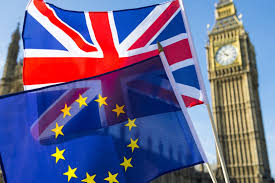
Both the United Kingdom and the European Union have said that they are willing to walk away without making any deal than to compromise on issues crucial for them with respect to a post Brexit deal which reflected the stance taken by both the parties about negotiations that are set to be opened soon.
"We want a free trade agreement" - but not at any cost, said U.K. Prime Minister Boris Johnson during a speech to business leaders and international diplomats in London which was a message from London to Brussels.
"I see no need to bind ourselves to an agreement with the EU," he said and insisted that Britain would "restore full sovereign control" over its borders, rules and economy.
A similar tough stance was also taken by the EU as its chief negotiator Michel Barnier said that the remaining 27 members countries of the block will not conceded to any proposal that Britain proposes just to avoid a no-deal Brexti and the chaos that will follow. The two parties have 11 months to negotiate a deal on various issues including trade during what is known as the transition period.
"We are in favor of free trade, but we are not going to be naive," Barnier said. "If the request is to have broad access to a market of 450 million European consumers, zero tariffs, zero quotas - that won't happen for nothing, or in any kind of condition."
The initial agreement between the UK and the EU for the Brexit comprises of both sides pledging to come to an "ambitious, broad, deep and flexible partnership" that would include the issues of a free trade deal as well as other agreement on security among others.
The details of these deals are expected to be worked out between the two parties during the 11 month transition period so that the two parties are able to continue with a normal relationship with each other. During this transition period, the rules and regulations of the EU will be followed by the UK even though it will no longer be a part of the decision making process of the EU.
And after that the relationship depend on what agreement the two sides manage to etch out with each other even though Johnson has insisted that the choice for the UK was not "deal or no deal."
"The question is whether we agree a trading relationship with the EU comparable to Canada's - or more like Australia's," Johnson said.
There is no free trade agreement between the EU and Australia and therefore a similar trade agreement will mean that the UK and the EU will have to deal with new tariffs and other barriers in trading. EU is the largest trading partner of the UK.
The aim of the UK however is to achieve a trade agreement with the EU on line with the EU-Canada agreement that would ensure that almost all tariffs are eliminated and both goods and services are covered. However the UK wants that EU rules do not get applicable for it in the deal and in its efforts to achieve a favorable trade agreement.
(Source:www.businesstoday.in)
"We want a free trade agreement" - but not at any cost, said U.K. Prime Minister Boris Johnson during a speech to business leaders and international diplomats in London which was a message from London to Brussels.
"I see no need to bind ourselves to an agreement with the EU," he said and insisted that Britain would "restore full sovereign control" over its borders, rules and economy.
A similar tough stance was also taken by the EU as its chief negotiator Michel Barnier said that the remaining 27 members countries of the block will not conceded to any proposal that Britain proposes just to avoid a no-deal Brexti and the chaos that will follow. The two parties have 11 months to negotiate a deal on various issues including trade during what is known as the transition period.
"We are in favor of free trade, but we are not going to be naive," Barnier said. "If the request is to have broad access to a market of 450 million European consumers, zero tariffs, zero quotas - that won't happen for nothing, or in any kind of condition."
The initial agreement between the UK and the EU for the Brexit comprises of both sides pledging to come to an "ambitious, broad, deep and flexible partnership" that would include the issues of a free trade deal as well as other agreement on security among others.
The details of these deals are expected to be worked out between the two parties during the 11 month transition period so that the two parties are able to continue with a normal relationship with each other. During this transition period, the rules and regulations of the EU will be followed by the UK even though it will no longer be a part of the decision making process of the EU.
And after that the relationship depend on what agreement the two sides manage to etch out with each other even though Johnson has insisted that the choice for the UK was not "deal or no deal."
"The question is whether we agree a trading relationship with the EU comparable to Canada's - or more like Australia's," Johnson said.
There is no free trade agreement between the EU and Australia and therefore a similar trade agreement will mean that the UK and the EU will have to deal with new tariffs and other barriers in trading. EU is the largest trading partner of the UK.
The aim of the UK however is to achieve a trade agreement with the EU on line with the EU-Canada agreement that would ensure that almost all tariffs are eliminated and both goods and services are covered. However the UK wants that EU rules do not get applicable for it in the deal and in its efforts to achieve a favorable trade agreement.
(Source:www.businesstoday.in)





